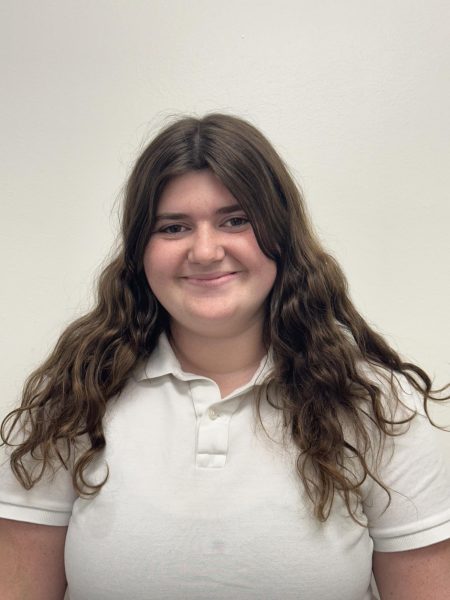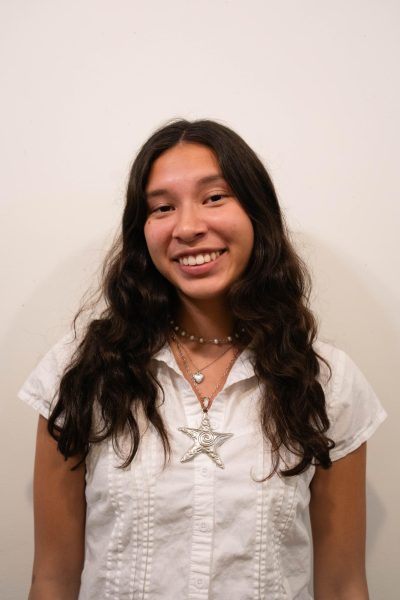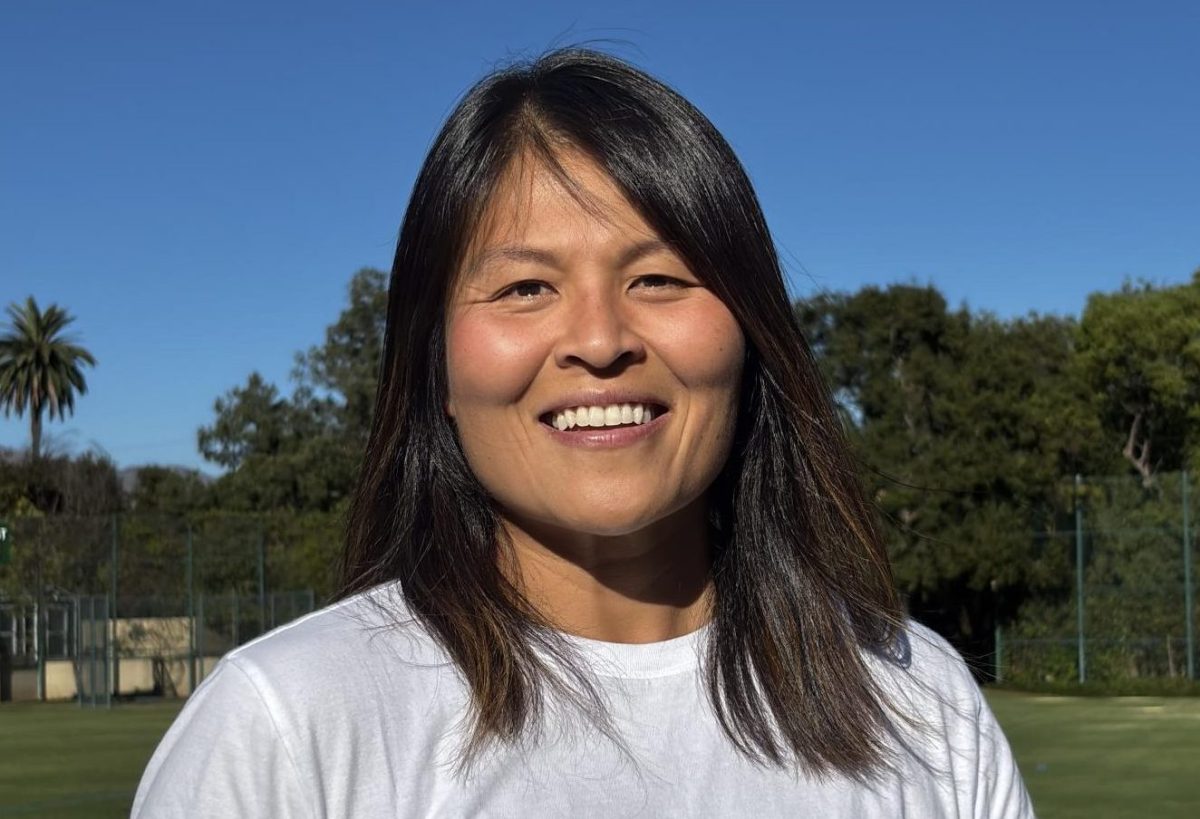From April 22 to April 26, Westridge celebrated Earth Week, an annual celebration for Westridge. The Green Guerrillas, Westridge’s sustainability club, organized events and posted signs encouraging students to avoid plastic cups and utensils and embrace reusable alternatives. At Monday’s weekly Upper School Town Meeting, students spoke about how they were “environmental stewards.” During lunches, students competed in environmental trivia, sorted trash into proper bins, planted seeds, and advocated for California to pass the Green Amendment.
Earth Week has long been a tradition supported by the Green Guerrillas, often offering an opportunity to reflect on Westridge’s role in mitigating environmental issues. More so than ever, in recent years, passionate Westridge students, faculty, and parents have pushed the school to welcome more sustainable practices, fighting for changes in the Commons, creating student-run community gardens, and implementing other environmental projects.
At the center of conversations about sustainability lies the Commons, Westridge’s school cafeteria that serves hundreds of students, faculty, and staff every day. As the pandemic derailed typical dining practices, Westridge moved exclusively to disposable containers for more than a year. Post-pandemic, hundreds of students still use the Commons’ plastic cups and utensils daily.
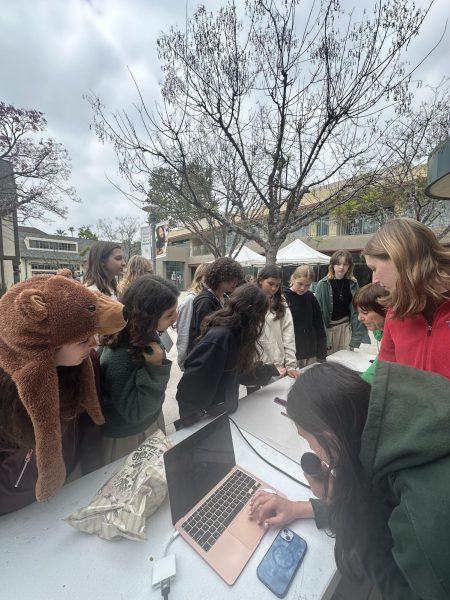
Attempts to bolster sustainability in the Commons go back to 2018, when the Green Guerrillas and their advisor, Upper School Service & Community Engagement Coordinator Ms. Erica St. John, influenced the Commons to switch from plastics to compostable products after getting rid of plastic lids and straws to minimize plastic use. In 2019, the Commons eliminated plastic retail bottles, selling only canned drinks.
The Green Guerillas are almost entirely responsible for the changes in the Commons, pre- and post-pandemic. Anna K. ’24, ASB Sustainability Head and Green Guerrillas Head for the past two years, led initiatives to reduce plastic and food waste in the Commons, like putting up plastic sad facts and posters reminding students to use reusable utensils. To her, fighting for a cleaner campus is important because of her love for the outdoors—intrinsically tied to a healthy environment.
In support of many of the Green Guerrillas’ initiatives is Mr. Brandon Worrell, Director of Dining Services. Though not every wish of the Green Guerrillas has been feasible for him and his staff, he hopes the Commons makes the switch to entirely reusable items. “It’s very difficult to constantly use the reusable, only because our biggest issue is they don’t get back to the kitchen. We find them in the bushes. We find them on the ground. We find them in the trash cans. So it’s kind of hard for us to continually buying the reusable products,” Mr. Worrell said.
While the Commons and the Green Guerrillas began providing reusable alternatives, they encountered challenges with not having enough space to store and wash reusable plates and utensils. Relying on students and staff to return the reusable items has also proven problematic. “When we started the year, we had about 97 bowls. I counted now and we’re down to [almost] 60,” Mr. Worrell said. He continued, “Our goal would be to just completely get away of all single use items, but in reality, it’s just a lot more difficult to kind of build that into our system.”
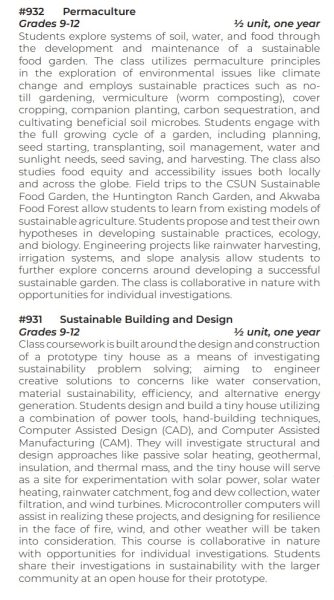
Despite offering reusable alternatives, many students still opt for single-use items. “It’s been a little disappointing to see students continue to use plastic utensils, even though there are metal ones available,” Anna said.
Penelope d. C. ’27 admitted she does not always use the offered reusable utensils and plates. “I use the plastic [utensils] because sometimes I’m sitting away from the bins, and I have a paper plate, so I just want to throw everything away at once,” she said.
Westridge’s curriculum has also shifted to offer more environmental and sustainable-based learning, which now includes a Permaculture class in both Upper and Middle School and a Sustainable Building and Design class in the Upper School. In 2022, Mr. David Prince, Upper School Art Teacher, and Mr. Mick Lorusso, STEAMWork Design Studio Coordinator, proposed the new Upper School elective courses. Permaculture allows students to work in the Westridge garden and grow edible food and native plants to support wildlife. Sustainable Building and Design teaches students to make creative engineering solutions to concerns like material sustainability and water conservation.
Nadine M. ’27, a student of the Permaculture elective, said, “[The class] is really fun actually, we plant all kinds of flowers and native plants, and we also just finished making a water source in a little pond.” Nadine has also learned the importance of native plants through the class.
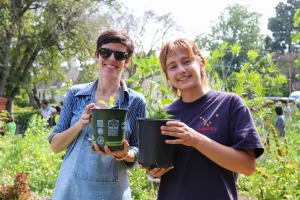
Not only are the classes educational for students, but they also have made immediate impacts on the Westridge campus. For example, the Permaculture class has reduced water use by 80% on their plot of land where they cultivate native plants and support pollinators. In the coming years, the class expects the garden to become more self-sustaining, yielding more edible food.
Although Mr. Lorusso and Mr. Prince’s positions are not specifically designed to focus on sustainability—their main purpose is to work in the STEAMWorks Design Studio—their dedication to the practice in their own lives made advocating for its presence at Westridge natural. “Mick and I had sustainability as a passion since before we came to Westridge, so it’s just been a kind of gradual and figuring out how to implement it,” Mr. Prince said. They also shared that the new electives and other sustainability efforts are because of an anonymous STEAM grant at Westridge; for the last two years, they have been using its funding for sustainability initiatives.
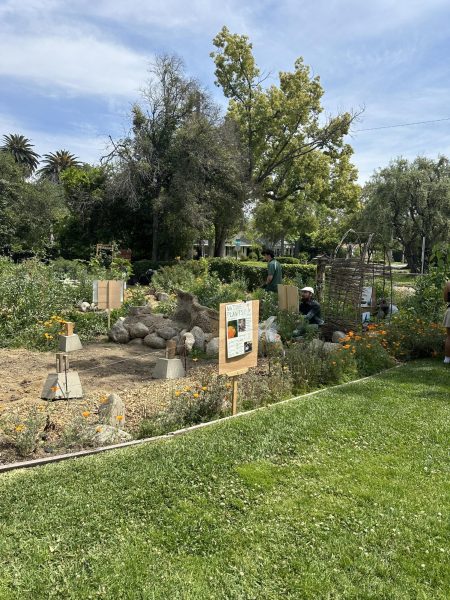
In addition to the Permaculture class’ garden on the State Street side of Westridge, Spyglass Design Contributor Alex S. ’24 revived lackluster garden beds behind the Science Building on Orange Grove for her Community Action Project (CAP). “I wanted to bring more native plants and like native ecology to campus spaces because I know the benefits they bring to the environment. Also, I knew it’d be a great educational space for students and teachers also,” she said. Alex, who will be studying forestry in college, plans to soon pass down the garden as she hopes it can be a long-lasting environmental staple on the Westridge campus.
As Westridge continues to reduce waste in the Commons, celebrate Earth Week, and introduce new courses on gardening and sustainable development, some students and faculty are adamant that this is just the beginning of many more environmentally friendly initiatives to come. Incoming Green Guerrillas heads Lily. J. ’25 and Lindsay C. ’25 said in a shared statement, “We hope to continue promoting sustainability on campus through interactive and educational activities that inspire people to implement sustainable practices in their daily life.” They continued to reference the Ridwell plastic film drive, sharing their goals for next year: “we plan on continuing to foster strong relationships with Ridwell and other similar organizations to work towards a greener Westridge.”




























![Dr. Zanita Kelly, Director of Lower and Middle School, pictured above, and the rest of Westridge Administration were instrumental to providing Westridge faculty and staff the support they needed after the Eaton fire. "[Teachers] are part of the community," said Dr. Kelly. "Just like our families and students."](https://westridgespyglass.org/wp-content/uploads/2025/03/dr.-kellyyy-1-e1748143600809.png)























